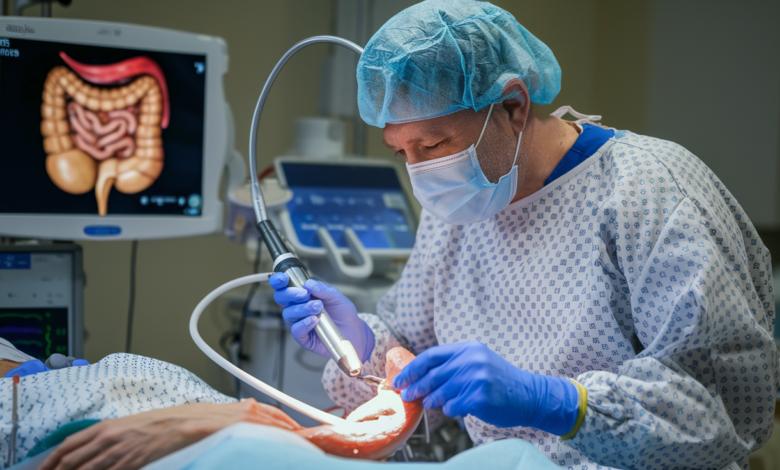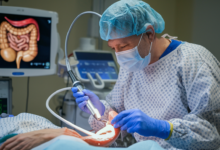Who Does Colonoscopy? The Right Doctor for Your Colon Health

A colonoscopy is a very important test to check your colon for problems like polyps, inflammation, or even early signs of cancer. But who does colonoscopy? The best doctor to perform a colonoscopy is usually a gastroenterologist or a colorectal surgeon. These doctors are trained to carefully examine your colon using a thin, flexible tube with a tiny camera. This test helps catch serious health issues before they get worse. Many people need a colonoscopy after they turn 45, but some might need it earlier if they have a family history of colon problems or experience symptoms like blood in their stool or unexplained stomach pain. Getting the right doctor for this procedure is very important because experience matters. A skilled specialist can make the process smoother and safer while giving you the best results.
Now that you know who does colonoscopy, it’s important to understand why choosing the right specialist is necessary. A gastroenterologist specializes in diagnosing and treating problems in the digestive system, including the colon. These doctors perform colonoscopy procedures almost every day, which means they have a lot of experience spotting issues that may not be obvious to others. On the other hand, a colorectal surgeon is a doctor who not only performs colonoscopies but also treats serious conditions like colon cancer or inflammatory bowel disease. If your colonoscopy shows any abnormal results, a colorectal surgeon may be needed for further treatment. Choosing the right specialist can help you feel comfortable and confident about your health. A colonoscopy might seem scary, but with the right doctor, it’s a safe and life-saving test.
Who Does Colonoscopy? Meet the Experts in Colon Health
A colonoscopy is done by doctors who specialize in digestive health. The two main experts are gastroenterologists and colorectal surgeons. A gastroenterologist is a doctor trained to diagnose and treat stomach and intestinal problems, including colon diseases. They perform colonoscopies regularly and can detect polyps, cancer, or other issues. A colorectal surgeon is another specialist who not only performs colonoscopies but also treats serious conditions like colon cancer, hemorrhoids, and Crohn’s disease. If a colonoscopy finds something unusual, a colorectal surgeon may be needed for further treatment. Choosing the right specialist is important to ensure a smooth procedure and accurate diagnosis. Always look for an experienced doctor with good patient reviews.
Why a Gastroenterologist Is the Best Doctor for Colonoscopy
A gastroenterologist is the best choice for a colonoscopy because they are trained to find and remove polyps, detect colon diseases, and prevent colon cancer. These specialists spend years studying the digestive system, making them highly skilled in performing colonoscopies safely. They also stay updated with the latest technology and medical advancements, improving accuracy and comfort for patients. Since they perform many colonoscopies, they can quickly identify problems that others might miss. They also provide advice on diet, lifestyle, and treatment if needed. If your colonoscopy shows any issues, your gastroenterologist can guide you on the next steps. Choosing an experienced gastroenterologist ensures the best care for your colon health.
Can a General Doctor Perform a Colonoscopy?
A general doctor (also called a primary care physician) does not usually perform a colonoscopy. They can recommend the test if they suspect colon issues but will refer you to a gastroenterologist or colorectal surgeon for the procedure. A general doctor may handle initial screenings like stool tests or blood tests, but a colonoscopy requires specialized skills and equipment. If you have a family history of colon cancer, digestive problems, or abnormal test results, your general doctor will send you to a specialist. While they play a key role in identifying the need for a colonoscopy, it’s best to have the test done by an expert in colon health for the most accurate results.
Gastroenterologist vs. Colorectal Surgeon: Who Should You Choose?
Both gastroenterologists and colorectal surgeons perform colonoscopies, but their roles differ. A gastroenterologist focuses on diagnosing and treating digestive system diseases. They perform colonoscopies regularly and can remove small polyps during the procedure. A colorectal surgeon, on the other hand, treats complex colon conditions like cancer, severe inflammation, or rectal disorders. If your colonoscopy shows a serious issue requiring surgery, a colorectal surgeon may handle the treatment. If you need a routine colonoscopy, a gastroenterologist is the best choice. However, if you have a known condition like colorectal cancer or need surgery, a colorectal surgeon might be more suitable. The choice depends on your health needs.
How Often Should You Get a Colonoscopy?
How often you need a colonoscopy depends on your age, health history, and risk factors. For most people, a colonoscopy is recommended every 10 years starting at age 45. If you have a family history of colon cancer, you may need it earlier and more often. If your last colonoscopy found polyps, your doctor might suggest a follow-up in 3 to 5 years. People with digestive diseases like Crohn’s or ulcerative colitis may need colonoscopies more frequently. If your results are normal, you won’t need another one for a decade. Regular screening helps catch colon cancer early, making treatment easier and more effective. Always follow your doctor’s advice about when to schedule your next colonoscopy.
What Happens During a Colonoscopy? A Step-by-Step Guide
A colonoscopy starts with the patient lying on their side while the doctor inserts a thin, flexible tube with a camera into the rectum. The tube slowly moves through the colon, allowing the doctor to check for polyps, inflammation, or cancer. Air is pumped in to expand the colon for a clearer view. If any abnormal tissue or polyps are found, they can be removed during the procedure. The process usually takes 30 to 60 minutes. Patients are given sedation to stay relaxed and comfortable. After the test, results are reviewed, and the doctor may recommend follow-up care. Colonoscopy is the best way to detect colon problems early.
How to Prepare for a Colonoscopy: Easy Steps to Follow
Before a colonoscopy, your colon must be empty for clear results. Doctors usually recommend a clear-liquid diet a day before the test, avoiding solid foods. You’ll also need to drink a special laxative solution to clean out your intestines. It’s important to stay near a bathroom during this time. Certain medications, like blood thinners, may need to be stopped before the procedure—always check with your doctor. Avoid red or purple liquids, as they can be mistaken for blood. Proper preparation ensures a smooth procedure and accurate results. Following your doctor’s instructions carefully is the key to a successful colonoscopy.
Does a Colonoscopy Hurt? What You Should Expect
Most people worry that a colonoscopy might be painful, but the procedure is usually not painful at all. Doctors give sedation to help patients relax or even sleep during the test. Some people may feel mild cramping or bloating afterward because air is used to expand the colon. These discomforts usually go away within a few hours. If a polyp is removed, there might be slight discomfort, but it is not severe. Serious pain is rare, and if it happens, you should call your doctor. A colonoscopy is a safe procedure, and most patients find it easier than expected.
Who Needs a Colonoscopy? Signs You Shouldn’t Ignore
A colonoscopy is recommended for anyone aged 45 and older as a routine screening. However, some people may need it earlier. If you have blood in your stool, stomach pain, unexplained weight loss, or long-term diarrhea or constipation, a colonoscopy may be necessary. A family history of colon cancer or polyps also increases your risk, meaning you might need earlier screening. If you have Crohn’s disease or ulcerative colitis, regular colonoscopies can help monitor your condition. Ignoring these symptoms can lead to serious health issues, so always check with a doctor if you experience any warning signs.
Colonoscopy Risks and Benefits: What You Need to Know
A colonoscopy is one of the best ways to detect colon problems early, but like any medical procedure, it has some risks. The main benefits include early detection of colon cancer, removal of polyps, and diagnosis of digestive diseases. Risks are rare but can include bleeding, infection, or a small chance of a colon tear (perforation). Some people may feel bloated or have mild discomfort after the procedure. However, the benefits far outweigh the risks because catching colon issues early can save lives. Always discuss any concerns with your doctor before the test.
Conclusion
A colonoscopy is an important test to keep your colon healthy. It helps doctors find problems like polyps, cancer, or other diseases early. The test is done by a gastroenterologist or a colorectal surgeon, and they are experts in colon health. If you are 45 or older or have symptoms like stomach pain, blood in stool, or changes in bowel habits, you should talk to a doctor about getting a colonoscopy.
Though some people worry about the test, it is safe and does not usually hurt. Doctors give sedation to make it comfortable. The benefits of a colonoscopy are much greater than the small risks. It can help find and prevent colon cancer, which can save lives. If your doctor recommends a colonoscopy, follow their advice and take care of your health.
FAQs
Q: Who performs a colonoscopy?
A: A gastroenterologist or a colorectal surgeon performs a colonoscopy. They are experts in colon health and trained to find problems in the large intestine.
Q: At what age should I get my first colonoscopy?
A: Most people should get their first colonoscopy at age 45. If you have a family history of colon cancer, your doctor may recommend it earlier.
Q: Does a colonoscopy hurt?
A: No, a colonoscopy does not usually hurt. You will get sedation to help you relax, and most people do not feel anything during the test.
Q: How long does a colonoscopy take?
A: A colonoscopy usually takes 30 to 60 minutes. However, you will need extra time to recover from sedation before going home.
Q: What should I eat before a colonoscopy?
A: Before a colonoscopy, you should follow a clear-liquid diet and avoid solid foods. Your doctor will also give you a special drink to clean your intestines.

